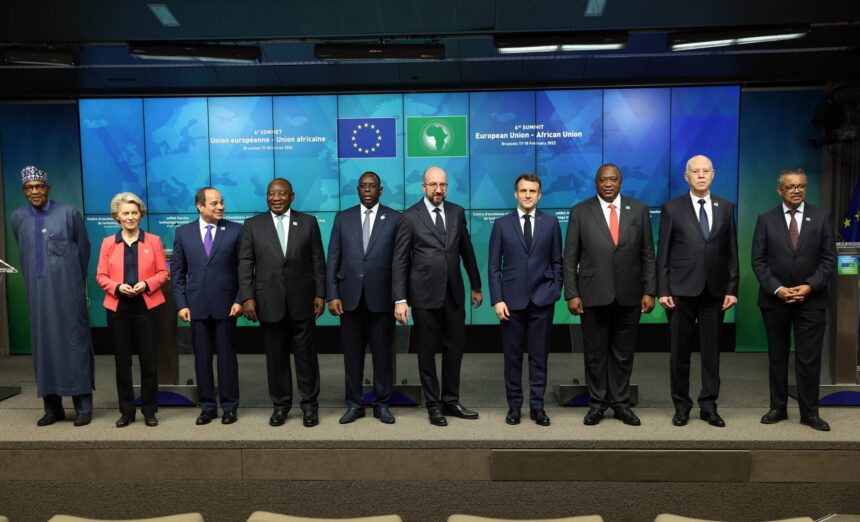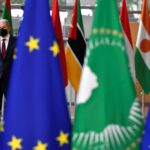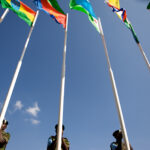Summary by Geopolist | Istanbul Center for Geopolitics:
A Radical Change of Mindset Is Needed To Get The Africa-Europe Relationship Back On Track
A love-hate relationship
In the past years, the Europe-Africa Partnership was confronted with ups and downs. On 9 March 2020, the EU launched a new strategy with Africa. A few days later, the world ended up in a COVID lockdown for almost two years and the strategy was buried under the dust. On 17-18 February 2022, the long-awaited 6th EU-AU summit finally took place in Brussels in what Charles Michel, President of the European Council described as “a new forward-looking ambitious spirit”. New plans to revive the partnership were exposed, with an ambitious Global Gateway Investment package for Africa of some 150 billion euro, including in the aftermath of COVID, promising initiatives in support of vaccine manufacturing in Africa. But then fate struck again, and the momentum got lost. Just one week after the summit, the unthinkable happened with the Russian invasion of Ukraine on 24 February 2022. The EU was forced to pay the utmost attention to its Eastern Neighbourhood. Ambitious plans with Africa were scaled down and many African countries refused to choose sides in what was seen to be an internal European conflict.
In the meantime, the OACPS-EU Post Cotonou negotiations for a successor agreement were dragging on for several years, with little progress. This parallel postcolonial agreement with countries from Sub-Saharan Africa, the Caribbean and the Pacific, proved its irrelevance with limited political traction. It was supposed to be signed on 15 November 2023 in the Pacific Island of Samoa but at the very last moment some 30 out of the 79 OACPS countries refused to do so, mainly because of provisions related to migration, Sexual and Reproductive Health Rights and the LGBTQIA+ issue. Under big pressure of the EU, most of these countries finally signed in the last days of 2023, but to date there are still some 10 countries, including African powerhouse Nigeria, who did not sign. With the earlier withdrawal in 2022 of South Africa, the other African heavy weight, OACPS Group and the Samoa agreement seem more dead than alive. Few days after the Samoa debacle on 20 November a poorly timed AU-EU Ministerial was cancelled. Many African ministers who were still on their long way home from Samoa refused to come to Brussels for this ministerial that took place at a moment of growing divisions between the EU and several African countries, particularly on the Israel-Palestine conflict.
Today, the EU and the AU seem incapable of agreeing on a date for a new heads of state summit and some even doubt whether this will take place before 2030. Clearly, Europe-Africa relations seem to be in the grip of Murphy’s Law: Anything that can go wrong will go wrong, and at the worst possible time. But this succession of failures and missed opportunities is not just accidental. They are clear signs of a deeply troubled relationship between the EU and Africa and, by extension, between “the Western world” and the “Global South”.
Changing power relations
In the new multi-polar world order, Africa can choose “à la carte” from the menu that is presented to them by different partners. The BRICS, as a relatively new club, is rapidly becoming attractive for countries in the Global South. This group of countries questions the multilateral rules based global order and institutions which they consider to be unfair, dominated by the West, and no longer representative for the shifting economic and political power at global level. The divided and ambiguous EU reactions to the human catastrophe in Gaza has cost Europe a lot of credit in Africa. Also, the controversial EU deals with North African countries to curb migration make it increasingly difficult for the EU to claim the moral high ground in the world. Patronising attitudes, double standards and interference in internal matters by former colonial powers such as France, have strengthened anti-European feelings and increased Russia’s footprint. The EU is now at a crossroads and is desperately trying to counter negative perceptions. However, beyond the widely promoted flagships of the Global Gateway, more convincing actions will be needed to regain the trust of Africa.
Fundamental changes needed
What could be a possible way forward for the new European leadership to revitalise the partnership with Africa?
First, end the traditional North-South dependency relations and invest in interest driven partnerships amongst equals. This is more easily said than done. It implies a radical break with post-colonial clientelist arrangements (OACPS, Commonwealth, Francophonie) with unidirectional financial commitments and ways of norms enforcement. Obviously, this also requires a more proactive African leadership that clearly spells out its expectations and interests vis-a vis the EU and that is willing to drop its longstanding vested interests. A more equal partnership also implies more European empathy for African concerns and aspirations in key areas such as climate change, food security, energy, health, manufacturing, labour mobility and the representation of Africa in global institutions. For every European birth, 12 Africans will be born between now and 2050. Between now and 2035 there will be more young Africans entering the workforce each year than in the rest of the world combined. This provides an enormous potential for a reinforced partnership based on mutual interests . This awareness is also trickling down in several EU member states that never had colonial ties with Africa. These Central and Eastern European countries elaborated in the past years own national Africa strategies focussing on joint opportunities in innovative sectors such as digitalisation, renewable energy and circular economy. They also are opening Embassies at the level of the AU in Addis Ababa and in key African countries.
Second, continue to invest in a stronger geopolitical EU that will earn more respect. In today’s contested world, major EU investments in defence are inevitable. Strategic autonomy and “speaking the language of power” will be more needed than ever at a moment when the relationship with the USA could be at risk after the next American elections. So far Europe did reasonably well in its joint response to the Russian invasion of Ukraine. However, it is also in its interest to deploy similar unity of action in relation to conflicts in the Middle East and Africa that seem far from Europe’s borders. In fact, these conflicts have a major impact on European security and migration fears, resulting in the rise of right- wing populist parties in the most recent European and national elections. If the EU wants to become a geopolitical player reducing national veto power and European treaty changes will be unavoidable.
Third, defend the EU’s “soft power” but do it with more consistency and less double standards. Security based approaches, inevitably, need to be complemented with non-military support aimed at tackling the root causes of political instability and conflicts. In terms of “soft power” the EU is a global superpower that shapes global norms, standards and legislation in all major policy domains: international trade, green transition, deforestation, renewable energy, food security, raw materials, the sustainable development goals, values agendas, labour standards, cyber security, privacy, artificial intelligence, hate speech and fake news etc. This “Brussels effect” aims to improve the wellbeing of citizens, but it is also increasingly perceived as serving the EU’s own economic interests. Citizens in Europe and in the Global South, including Africa, increasingly question these norms. In Europe, the loss of the green parties and the rise of the extreme right in the recent EP elections could be attributed to the perceived high costs of the green transition for some economic groups, including farmers. In the Global South resentment is growing over the use of double standards and the protectionist character of the geo-economic EU standards such as the Carbon Border Adjustment Mechanism (CBAM). EU regulations could be powerful tools to bring about positive change globally, but it remains essential to always mitigate the adverse effects of these for the most vulnerable populations in the Global South.
Fourth, stay engaged and learn to manage relations with countries that are not like minded.The global world of today is not perfect and European norms and value agendas are not always perceived to be universal. The imposition of sanctions or even EU withdrawal because of non-compliance with the EU’s values agendas will inevitably push these countries into the hands of other global powers. Staying engaged in authoritarian led countries while finding creative ways to reach out to the reform-minded and dynamic forces in society will be the best recipes for restoring trust in democracy.
Fifth, under-promise and overdeliver! The EU tends to be perceived in Africa as a player that is “overpromising and underdelivering”. To correct that image, there is no need for more EU comprehensive strategies and “love declarations”. The EU should practice what it preaches. It is in its own interest to support Africa’s aspirations including for a better representation of Africa in the multilateral system, reforms of the UN security Council and UN institutions and the international trade and financing system such as IMF and World bank. If these reforms remain a dead letter, Africa and the Global South will create their own institutions or align themselves with other global players (BRICS) who, at the end of the day have the ambition to break the power and influence of the Western world.
The way forward for the EU in its partnership with Africa and the Global South will be bumpy and complex. In a more competitive world, the EU still offers an attractive model with unique selling points. There is no need for self-flagellation but the new European leadership should also not be complacent and confront the many challenges head on!
By: Geert Laporte
Source: ISPI







